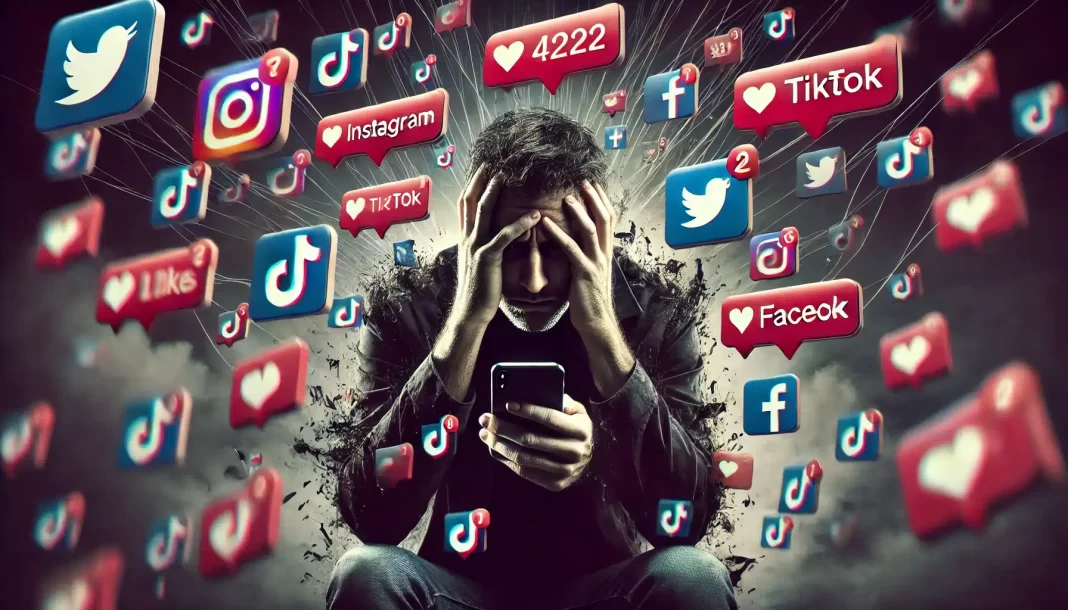Social media platforms have become deeply integrated into everyday life, offering a way to stay connected, informed, and entertained. However, this constant connectivity has a darker side: social media addiction. As people spend more and more time online, the negative effects on mental health have become increasingly apparent. From compulsive checking to feelings of inadequacy, social media addiction is impacting mental well-being in ways that are only now being fully understood.
The Rise of Social Media Addiction
One of the primary causes of this addiction is the dopamine-driven reward loop. Every time users receive likes or comments, their brains release dopamine, a chemical that gives them a sense of pleasure. This system reinforces the habit of frequently checking and engaging with social media, creating a dependency that many find hard to break.
Social media addiction is increasingly recognized as a significant mental health issue. With platforms like Instagram, Facebook, and TikTok embedded in our daily routines, many users now struggle with compulsive behavior around their usage. This constant engagement, driven by the need for validation through likes, comments, and interactions, has been closely linked to anxiety, depression, and low self-esteem.
Mental Health Impacts of Social Media Addiction
Social media use has been shown to increase feelings of loneliness and social anxiety. Heavy users are more likely to experience depression, as they continuously compare their lives to the seemingly perfect versions of others presented online. This constant comparison fosters feelings of inadequacy, especially for younger users, who are particularly vulnerable to the pressures of social validation.
Additionally, the phenomenon known as FOMO (Fear of Missing Out) exacerbates anxiety. Users may feel the need to stay connected at all times, fearing they might miss an event or update. This often leads to compulsive checking and significantly disrupts real-world activities. FOMO has been associated with higher levels of dissatisfaction and stress among social media users.
Impact on Self-Esteem
Social media platforms promote curated versions of people’s lives, which can create unrealistic standards. Users, especially teenagers, may feel inadequate if their posts don’t receive enough likes or attention. The constant need to maintain an attractive online persona can cause self-esteem issues, with many users developing body image concerns based on their perceptions of others online.
Impulse Control and Real-Life Consequences
The addictive nature of social media can lead to impulse control issues, where users find themselves constantly checking their accounts during work, school, or even social interactions. This behavior not only disrupts focus but can also cause sleep problems and negatively impact personal relationships. Over time, the compulsive need to stay connected online can erode the ability to engage meaningfully in face-to-face interactions, leaving users feeling isolated despite their digital connections.
Why Social Media Addiction Matters
Social media addiction poses a significant threat to mental well-being. The rise of social platforms has given birth to a new kind of behavioral addiction that not only impacts individuals’ psychological health but also their productivity and interpersonal relationships. Younger generations, in particular, are most vulnerable to the mental health impacts of excessive social media use, including anxiety, depression, and self-esteem issues. Recognizing and addressing this addiction is essential for both individuals and society at large.
Solutions and Recommendations
To reduce the negative impacts of social media addiction, experts recommend self-monitoring and reducing screen time. Digital detoxes—planned breaks from social media—have been shown to improve mental health. Additionally, it’s crucial to focus on developing healthier habits, such as using social media purposefully rather than out of boredom or a need for validation.
Parents and educators can also play a role by teaching digital literacy and encouraging more mindful use of social media platforms. Promoting real-world interactions over online validation can help young users balance their online and offline lives.
Conclusion
As social media becomes an integral part of our lives, the risks of addiction and its impact on mental health continue to rise. To combat this, individuals must develop healthier habits, take regular breaks, and reassess their relationship with digital platforms. Addressing social media addiction will be crucial in protecting mental well-being in the years to come.





